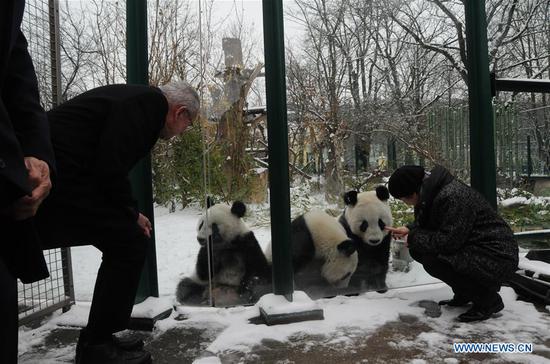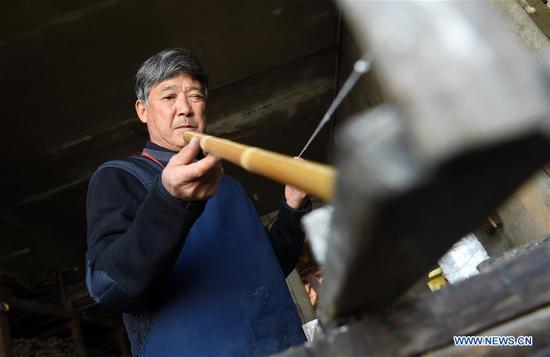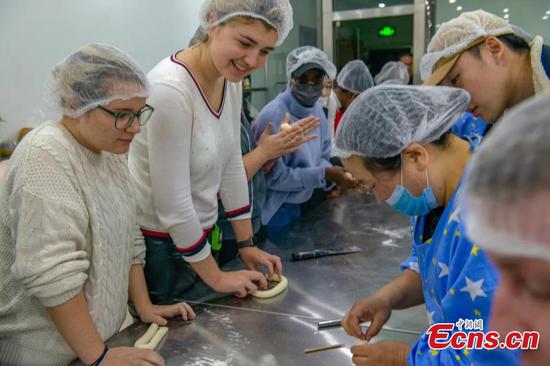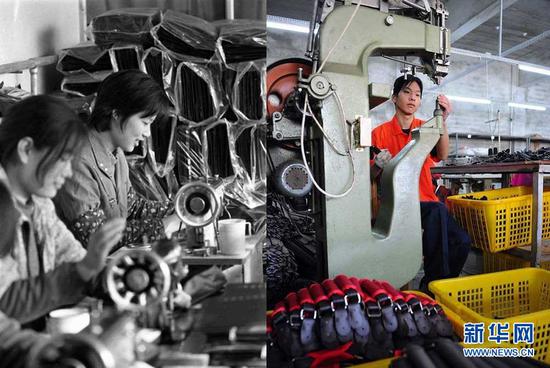
Retailers introduce Tibet's highland barley tea at an exposition in Beijing. (Photo by Chen Xiaogen/For China Daily)
Farmers in poverty-stricken areas of the Tibetan plateau in Southwest China have found ways to sell their crops and related products to customers worldwide, thanks to a newly built marketing system.
By the end of 2014, about 75 percent of Tibet's population were living in rural areas, data from the Tibet Yearbook showed. They rely on agriculture for subsistence. Rice, barley, wheat, honey, and meat are the main products they trade.
For a long time, local farmers have faced challenges in selling their produce, due to inadequate communication networks like transport systems. That hindered access to customers.
But that is about to change. Cui Taifu, general manager of the Tibet Supply and Marketing Cooperatives, said the organization expects to build offline stores in 20 to 50 major Chinese cities to display and sell Tibetan goods.
A new e-commerce platform will complement the efforts to increase sales and bring wealth to the natives of Tibet.
"Most of the rural areas are remote. Some of Tibet's crops may rot within three months. So if farmers can't sell their crops in time, they would lack motivation to produce food," Cui said. "We aim to build the whole marketing channel to help enlarge production and income for them."
These days, Liu Yali, sales manager of Tibet Jishun Biological Technology Co Ltd, is busy stocking up highland barley vinegar on the shelves of a company store in Lhasa. The store opened in September.
"Tibet has very rich resources. The highland barley, for example, can help ease high blood pressure, diabetes and hyperlipidemia," she said. "The water and air are also clean."
However, doing business in Tibet is not easy, since the costs of raw materials, human resources and production are very high due to poor living environment on the plateau, she said.
For example, Tibet does not have bottle suppliers, so local merchants have to buy bottles from the inland, which increases the cost by 1.5 times, she said.
Jishun Biological's revenue reached about 5 million yuan ($722,000) last year, but it still has not broken even.
"The biggest problem is how to increase sales," she said, adding franchisers and agents charge fees, but the cooperatives provide free space to exhibit and sell their products, which will help them enter such stores in other cities later.
"It's too expensive to cover the huge Chinese market by ourselves. We are happy to have such a platform," Liu said.
Yi Chuanhu, general manager of Chamdo Junqin Agricultural Technology Development Co Ltd, a highland barley cornmeal, powder and rice producer, said: "Highland barley is the most common agricultural product in Tibet. I hope more people can know about the green plateau products by joining the cooperatives."
Tenzin Yonten, a young entrepreneur, put his wheat-based edible chopsticks on the shop shelves, expecting to attract customers with innovative agricultural products and promote the idea of environmental protection.
Yonten, a native, returned to his hometown to run his own business with two of his friends after graduating from Southwest Minzu University.
"Locals used to plant crops and consume the stuff themselves, with residual stock sold at cheap prices," he said, adding the cooperative approach is a good channel to link potential clients and business partners.
The Supply and Marketing Cooperatives is a nationwide system initiated by the central government in the 1950s. It has been a key platform for the distribution of agricultural products in rural areas over the past decades.
The Tibetan branch of the Cooperatives plans to set up 50 sites across Tibet before 2020 to supply daily goods and agricultural materials, teach technical skills, purchase agricultural products for farmers, as well as conducting preliminary processing, according to Cui.
Each site is expected to increase income of the natives by 250 million yuan, serving 25,000 people.
From early 2017, the company has helped five local companies to link up with inland sales agencies, which increased the amount of raw agricultural products bought by up to 10 million yuan per year, Cui said.
Peiqiang Meat Industry is one of those five companies. Wu Zhiqiang, its general manager, said its sales grew by 60 to 70 percent after joining the Cooperatives.
Its products were sold to Beijing, Shanghai, Chengdu and Central China's Hunan province. Customers tend to trust products bearing the trademark of the Cooperatives and those sold on an official platform, he said.


















































